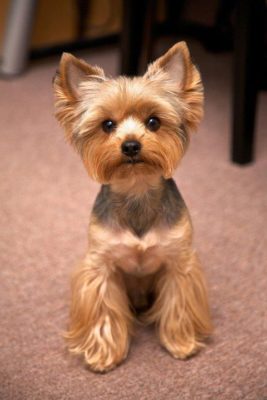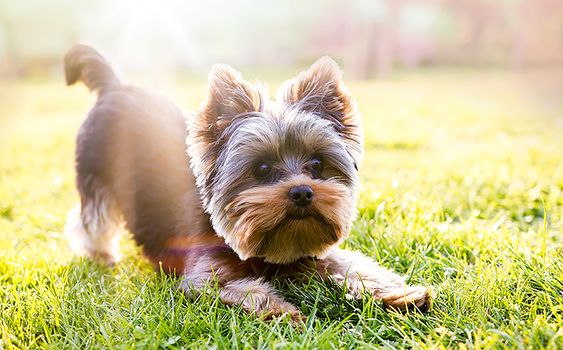Yorkshire Terrier
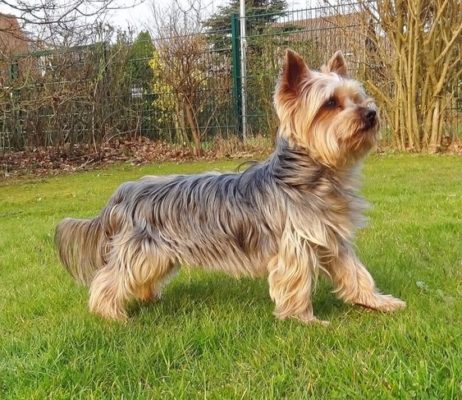
They are a very sweet and friendly breed of dog that will gladly keep humans company. Yorkshire Terriers are not vindictive; they are more like carefree children living in a fairy tale world. Yorkies love walks, playing with other dogs, and various activities. They are very good to children and love to play with them.
Table of Contents
Breed Information
| Another Name | Yorkie |
| Origin | Yorkshire, England |
| Height | Up to 23 cm |
| Weight | Up to 3.1 kg |
| Fur | Longhair |
| Color | Black, blue, black and gold, blue and gold |
| Lifespan | 12-15 years |
| FCI Classification | Terriers |
| Group | Dogs for children, decorative dogs, dogs for apartments, hypoallergenic dogs |
| Price | $500-8000 |
Breed Photos
Origin History
The history of the Yorkshire Terrier breed originated in Yorkshire’s English county (hence the name). During the Industrial Revolution in England, common laborers were forbidden to keep large hunting dogs, so people got small pets. Small terriers were especially valued and were excellent rat hunters.
Of course, those dogs were many times larger than the representatives of this breed today. Experts cannot say what breed of dog, the Paisley Terrier, was crossed, but subsequently, a breed resembling the current Yorkshire Terrier was obtained.
Such dogs were no longer suitable for catching rats, as they were quite small in size. However, Yorkshire Terriers appealed to aristocratic society. However, this name did not exist at that time. It appeared a little later, namely in 1870. After its appearance at the kennel show and the first club of these dogs, Yorkshire’s great popularity was established in the British Kingdom in 1898.
Appearance
Yorkshire Terriers are petite, robust dogs, about two pounds, with a slightly flattened snout, a sharp nose, and round dark eyes. Perhaps the distinctive feature of the Yorkie is the hair – it can reach an incredible length.
The paws are in proportion to the body; the tail is short, can be both bent and dangling. The ears are V-shaped, erect. Miniature torso, small head, planted on a long neck.
Character
They are a very sweet and friendly breed of dog that will gladly keep humans company. Yorkshire Terriers are not vindictive; they are more like carefree children living in a fairy tale world.
Yorkies love walks, playing with other dogs, and various activities. They are very good to children and love to play with them. They tolerate travel and travel well, but they do not tolerate loneliness and separation from their owners very well. If possible, this should be avoided. Despite their friendliness, some individuals of this breed may bark excessively or be aggressive toward larger dogs. It should be countered with training and education, or you will get a headache.
Yorkshire Terriers need early socialization to feel more at ease with other animals and people later on. These dogs are great as a first pet, although they do require attention and care.
Care
Yorkshire Terriers have very long hair, so they need special care. The specifics of care will depend on what kind of hair you choose for your pet. Depending on the length of the pile, you need to brush the terrier at least once a week and sometimes more often.
It would help if you also kept your pet’s ears and eyes clean. Also, like any ornamental breed, terriers need a monthly nail trim. Bathing the Yorkshire Terrier should be done 2-3 times a week. Yorkies are very sensitive to low temperatures, so they need warm clothing in winter.
Training
Yorkshire Terriers are ornamental dogs, so they are often used as companions. The number of commands they are taught is kept to a minimum. It is definitely worth paying attention to the formation of your pet’s character. Especially what concerns obedience, you should be able to stop the impulses of your dog’s desires. After all, often, small dogs attack large ones, and sometimes the consequences are disastrous.
Keep in mind that Yorkies cannot concentrate for long periods on one task, so training should be short. Also, pay attention to repeating the material in everyday life. It will help your pet learn commands better.
Common Diseases
Yorkshire Terriers are prone to many genetic diseases, such as distichiasis, portosystemic schoonitis, tracheal collapse, and hypoglycemia (low blood sugar).
You should also pay more attention to checking your teeth. Yorkies are prone to improper dental development, and a specialist can only check this.
These dogs are very prone to cancer, cardiovascular, and musculoskeletal diseases. To avoid these ailments, you need regular vet checkups, vaccinations, proper care, and more frequent walks with your pooch.
Nutrition
The Yorkshire Terrier has a peculiar attitude toward food. They are not the kind of pet that greedily licks the bowl to the last crumb. You can feed a Yorkie homemade food or buy exceptional dry food in stores. The diet should consist of beef and chicken, offal, buckwheat, or rice. Treats for these dogs are vegetables and fruits, both raw and boiled.
There is a list of foods that should be avoided from your pet’s diet. These include fried, greasy, smoked foods, semolina, cereal porridge, baked goods, sausage, fatty cheese, butter, mushrooms, cabbage, chocolate, citrus fruits, etc. nuts.
Yorkies often suffer from a lack of appetite. The desire to eat may disappear entirely if you change the composition of the food for any reason. It is better to divide the meals into two or three times a day, not including treats for good behavior.
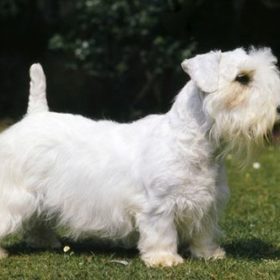 Sealyham Terrier
Sealyham Terrier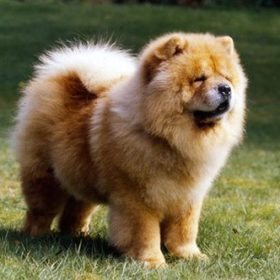 Chow Chow
Chow Chow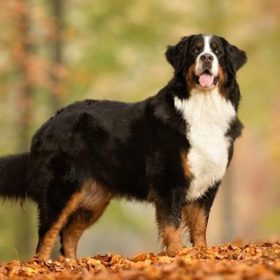 Bernese Mountain Dog
Bernese Mountain Dog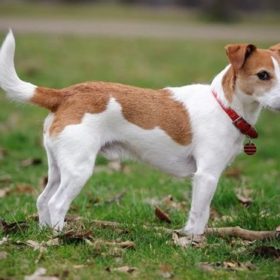 Parson Russell Terrier
Parson Russell Terrier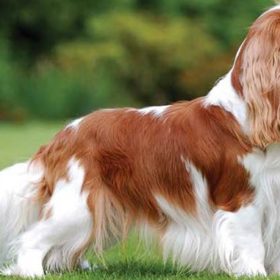 Cavalier King Charles Spaniel
Cavalier King Charles Spaniel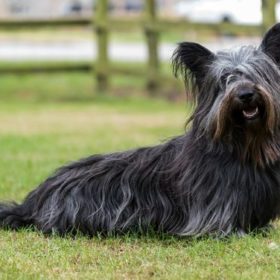 Skye Terrier
Skye Terrier